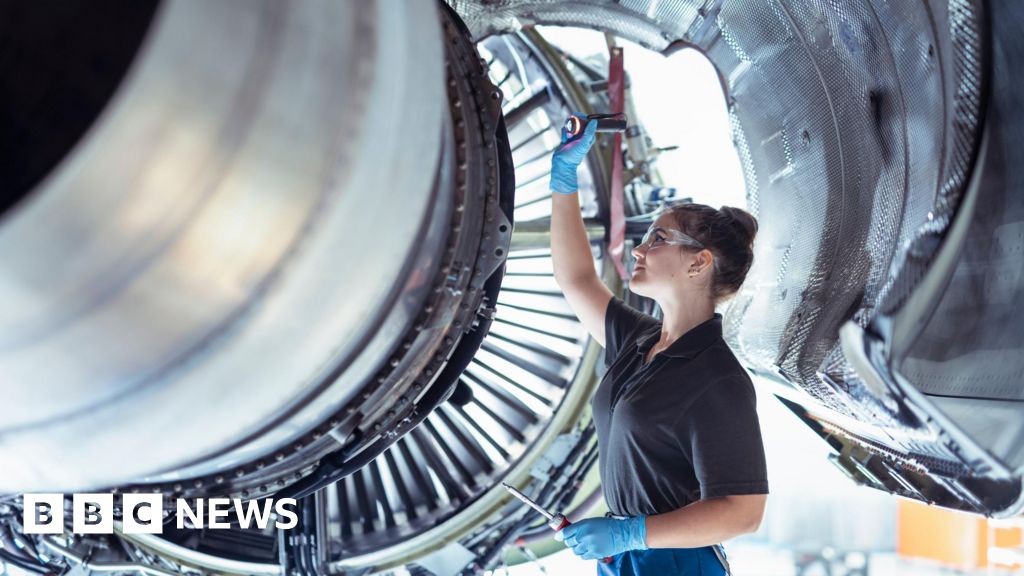
Image source, Getty Images
- author, Josh Barry
- Role, BBC News
Labor is promising to give businesses more flexibility over how they spend government money currently allocated to apprenticeships if they win the July election.
Shadow Education Secretary Bridget Phillipson says the party will allow businesses to use up to 50% of money provided by the government to fund apprenticeships or training for existing staff.
Labor has previously outlined a plan to “address skills shortages”, but the announcement provides more detail on how it hopes this plan will work on the ground.
It comes after the Conservatives said they would scrap some university courses to fund more apprenticeships.
The Conservatives said Labour’s proposal was “not well thought out”.
Apprenticeships are partly funded by money raised through taxes, as well as through the “apprenticeship levy” paid by large companies with an annual wage bill of more than £3m.
These companies, as well as small businesses, can then use this money to train apprentices.
Labour’s plans for what it calls a “growth and skills tax” include giving companies the option to spend up to half the money they receive to train existing staff in “high-level technical skills” such as retrofitting or engineering.
Under these schemes, employers can also offer ‘pre-apprenticeship training’ courses to prepare people for full apprenticeships or jobs.
At least 50% of the tax money will still be reserved for vocational training.
They say any courses must be from an approved list of essential skills, which can include areas such as digital and green skills, social care or childcare and that companies will not be able to use them for in-house training such as human resources or health and safety.
Labor said that if companies used just 3% of the extra flexibility, they could generate 150,000 training grants for young people.
Bridget Phillipson said the plans would create a “golden age of lifelong learning”.
She added: “Labour will put businesses in the driving seat to create the opportunities people need to get ahead at work.”
A party spokesman said he had no plans to increase the tax.
Education Secretary Gillian Keegan said Labour’s plans would halve the number of apprenticeships and hit small and medium businesses.
“Since 2010, we have built a world-class apprenticeship system from the ground up…creating pathways for 70% of careers through apprenticeships.”
The Liberal Democrats said their own plans include giving every adult “a pot of money” during their working lives to spend on education and retraining.
The Institute for Fiscal Studies (IFS) has warned that for apprenticeship schemes developed by either party to succeed, more companies must be persuaded to access available funding.
“Both major parties have now set out aspirations to increase the number of employees – especially young employees – in training or apprenticeships,” said Imran Tahir, an economic researcher at IFS.
“Ultimately, employers will decide how to use the funding, and at the moment many are choosing not to access the available funding.
“If these new programs are to benefit the youngest employees, either party will need to persuade employers to change their current patterns, which see nearly half of tax-funded apprenticeships taken by employees aged 25 and over.”
David Hughes, chief executive of the College Union, said the plans were a “good first step” in transforming the current apprenticeship levy, which, he says, “has not been implemented for young people”.
He added: “I would like to see more commitment to developing training and funding for skills at colleges for adults who need to learn in a rapidly changing world.
“Without urgent and significant growth in college opportunities, millions of adults risk being left behind as technology changes.”
According to the Institute for Fiscal Studies, average employer spending on training has fallen by 27% in real terms since 2011, and public spending on adult education and skills has fallen by 31% over the same period.
The number of people completing vocational training has also declined in recent years.
In England, 54.6% of trainees completed and passed the final assessment in 2022-23, well below the government’s target of 67% by the end of 2024-25.
A Department for Education report released in March 2022 indicated that four in 10 people who did not complete their apprenticeships cited personal reasons such as mental health issues, caring responsibilities or career changes.
However, about four in 10 said that apprenticeships were poorly managed, they were not given enough time to train or it did not meet their expectations.
There are no UK-wide figures for the number of apprentices, but there were 752,200 in England in 2023, higher than during the disruptions caused by the Covid pandemic, but lower than in the mid-2000s.
Additional reporting by Branwen Jeffries and Louise Martin

“Travel specialist. Typical social media scholar. Friend of animals everywhere. Freelance zombie ninja. Twitter buff.”





More Stories
Taiwan is preparing to face strong Typhoon Kung-ri
Israel orders residents of Baalbek, eastern Lebanon, to evacuate
Zelensky: North Korean forces are pushing the war with Russia “beyond the borders”